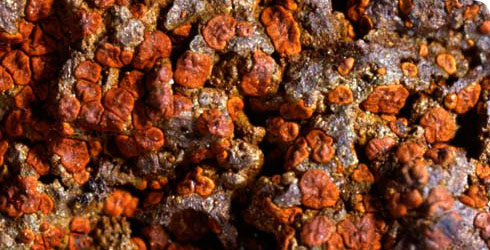Acarospora sinopica
Acarospora sinopica is a distinctive lichen species with a uniformly deep orange or rust-red thallus and volcano-like fruiting bodies.
Acarospora sinopica has successfully adapted to extreme environments where rocks are mineral rich, but nutrients are scarce.
Acarospora sinopica is widespread and has been found in Europe, the Americas, Asia and Australia.
Species detail
This rust-red lichen often occurs with other ‘metal-loving’, rust-coloured species such as Tremolecia atrata, Rhizocarpon oederi and Lecidea silacea. It looks similar to Acarospora smaragdula - a group of taxonomically tricky lichens.
-

Taxonomy
Acarospora sinopica has had several names. Find out why it has been tricky to classify.
-

Distribution and habitat
Find out where you might spot this brightly-coloured lichen.
-

Biology
Find out what lies behind the rust-like appearance of Acarospora sinopica.
-

References
Get more reference material for Acarospora sinopica.
Images
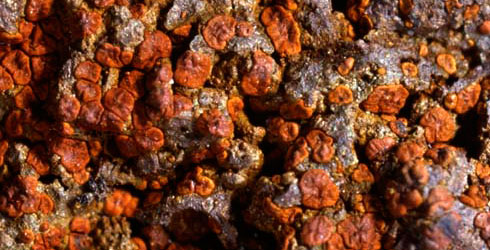
Acarospora sinopica Gjersvik, Nord Trøndelag, Norway. Purvis, 1982 Scale = 1 mm (NHM herbarium).
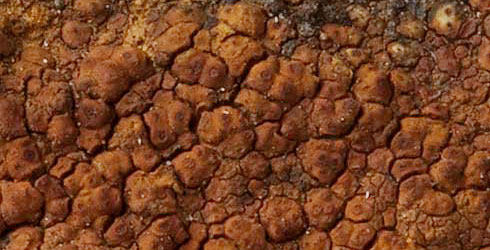
Acarospora sinopica found by Sophie Hanley and William Purvis at Parys Copper Mine, Wales on 20 April 2010. Natural History Museum herbarium.
© Natural History Museum, London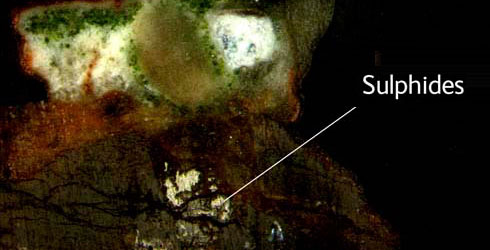
Section through A. sinopica sampled from Parys Copper Mines, Amlwch, Anglesey, Wales. O W Purvis and D A Jenkins, 20 March 2008 (NHM herbarium). Note sulphides present in rock and algal cells (green) beneath upper surface and surrounding immersed 'fruiting body'. Scale=0.25mm.
© Natural History Museum, London
Acid (pH 2) run-off from pyrrhotite (FeS1-x)-rich boulder colonised by Acarospora sinopica, Gjersvik, Nord Trøndelag, Norway. 1982. 15cm ruler.
© W Purvis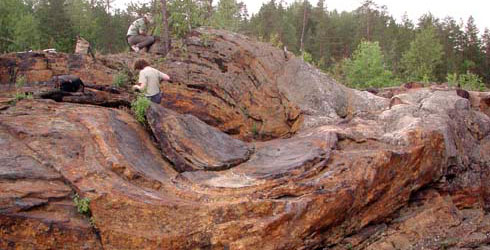
Mats Wedin and Anna Crewe at a Swedish sampling locality, 7 June 2002.
© Natural History Museum, London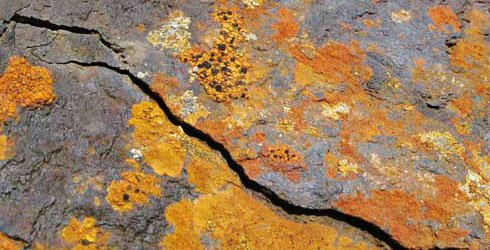
Acarospora sinopica (deep reddish brown) growing with Tremolecia atrata (orange-brown) and Lecidea silacea (orange-brown with large black 'fruiting bodies') on a mineralised glacial erratic boulder, Blair Atholl, Perthshire, Scotland, 23 July 2009.
© W Purvis
Parys Copper Mine, Amlwch, Anglesey, Wales. View from near vantage point by path, 20 April 2010.
© Natural History Museum, London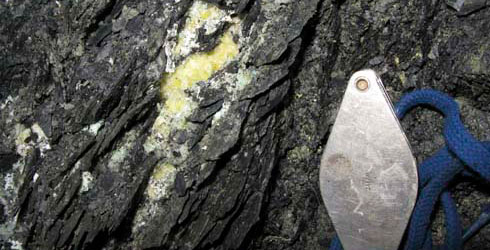
Numerous mineral species and unique mineral assemblages are associated with habitats where Acarospora sinopica and other 'metal-loving' lichens occur. This image shows "Halotrichite" [FeAl2(SO4)4· 22H2O], only found so far on shales on the surface. Magnifying glass is 85mm long. Parys Copper Mine, Amlwch, Anglesey, Wales. 20 March 2008.
© Natural History Museum, LondonAbout the author

$linktitle
Lichen researcher exploring lichen biodiversity under global climate change, Department of Botany.
A word from the author
"Acarospora sinopica has been a matter of taxonomic controversy for over 100 years. Species in unrelated genera adopt a rust colour in mineralised settings which is often considered to reflect geology and to have no taxonomic value. This is clearly not the case. A. sinopica is a born survivor of extreme environments found in conditions harmful to other organisms."
Toolbox
Glossary
Thalli – bodies of multicellumar organisms that are not organised into tissues and organs.
Asci- sexual spore-bearing cell.
